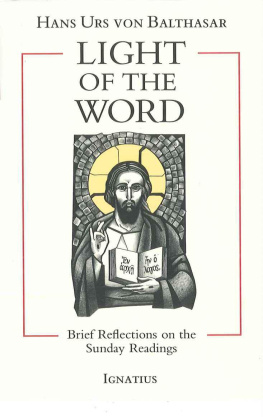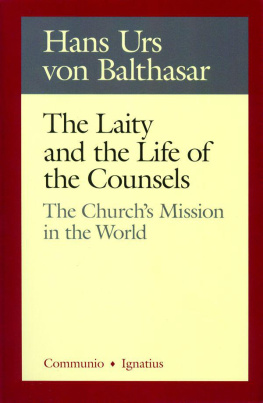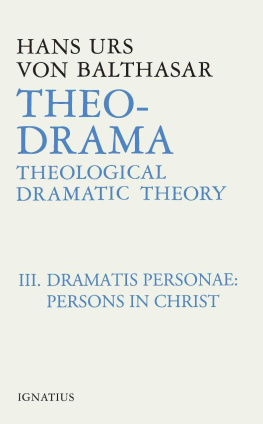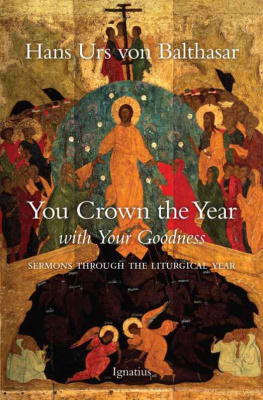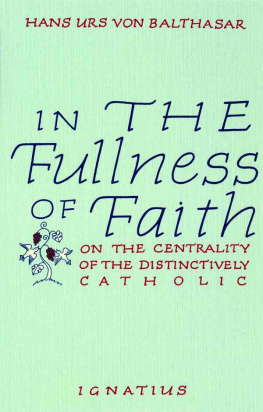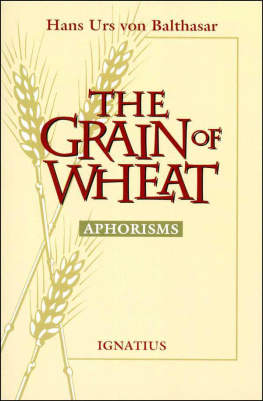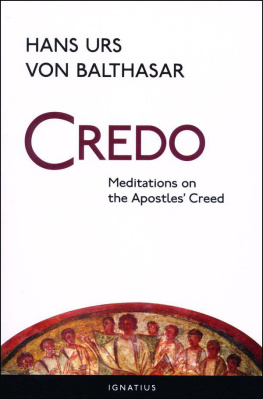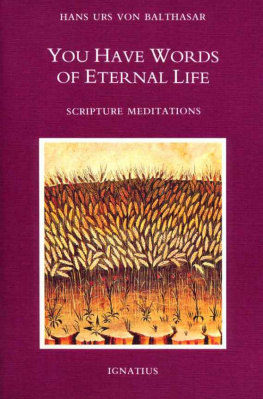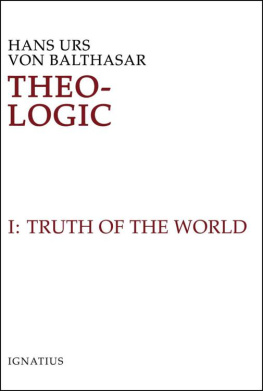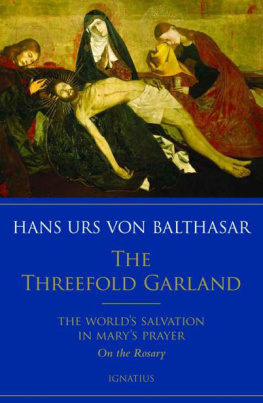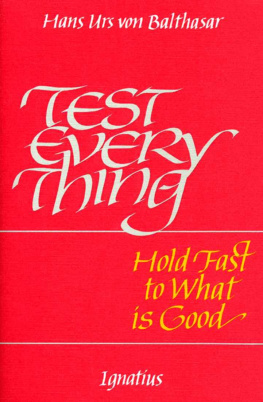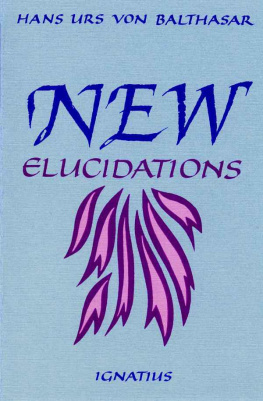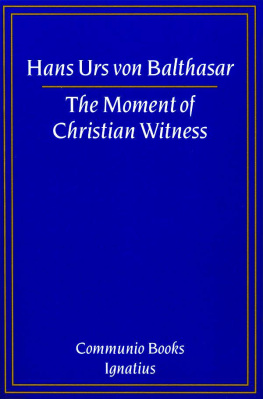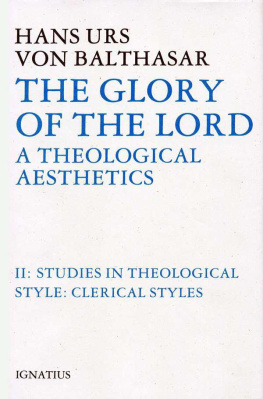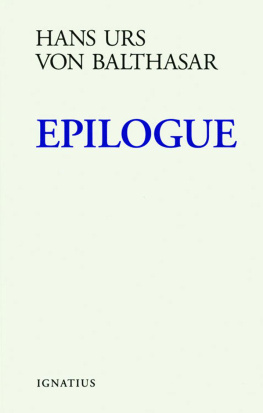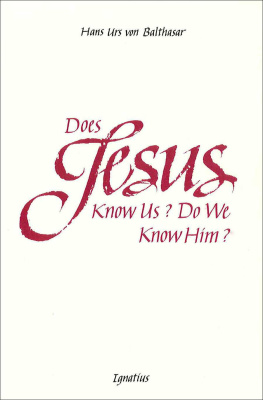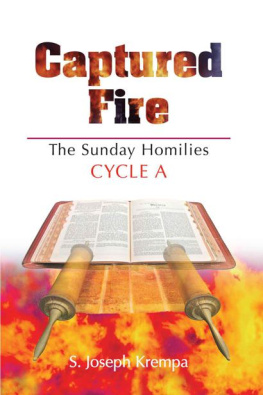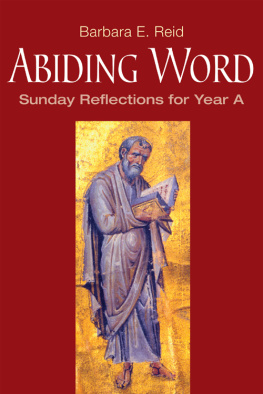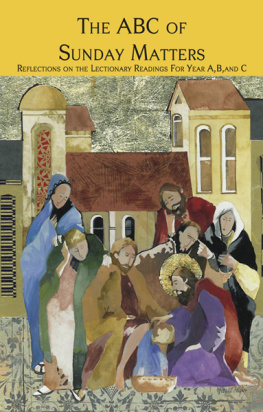LIGHT OF THE WORD:
Brief Reflections on the Sunday Readings
Hans Urs von Balthasar
Light of the Word
Brief Reflections on
the Sunday Readings
Translated by Dennis D. Martin
IGNATIUS PRESS SAN FRANCISCO
Title of the German original:
Licht des Wortes:
Skizzen zu alien Sonntagslesungen
Second edition 1992 Johannes Verlag
Einsiedeln, Freiburg im Breisgau
Cover art by Donald J. Rooney
Cover design by Roxanne Mei Lum
1993 Ignatius Press
All rights reserved
ISBN 978-0-89870-458-7
Library of Congress catalogue number 93-78538
Printed in the United States of America
CONTENTS
Christmas
Holy Family
Mary, Mother of God
Epiphany of the Lord
Baptism of the Lord
Ash Wednesday
Palm Sunday
Holy Thursday
Good Friday
Easter
Ascension
Pentecost
Trinity Sunday
Corpus Christi
Sacred Heart of Jesus
Christ the King
Christmas
Holy Family
Mary, Mother of God
Epiphany of the Lord
Baptism of the Lord
Ash Wednesday
Palm Sunday
Holy Thursday
Good Friday
Easter
Ascension
Pentecost
Trinity Sunday
Corpus Christi
Sacred Heart of Jesus
Christ the King
Christmas
Holy Family
Mary, Mother of God
Epiphany of the Lord
Baptism of the Lord
Ash Wednesday
Palm Sunday
Holy Thursday
Good Friday
Easter
Ascension
Pentecost
Trinity Sunday
Corpus Christi
Sacred Heart of Jesus
Christ the King
TRANSLATORS PREFACE
FATHER VON BALTHASAR based his sketches on the German and Latin lectionary texts. In the present translation, where German terminology in phrases set off in quotation marks by von Balthasar diverges significantly from the translations of the same passages in either the New American Bible or the English Lectionary for the Mass, I have translated the German and dropped the quotation marks. Where von Balthasars German phrases in quotation marks differ less significantly from the English language versions, I have translated them and retained the quotation marks.
One might also note that one of von Balthasars common metaphors is taken from one of his favorite areas of endeavor: music. The imagery he intends when he uses the term Auftakt (upbeat) is lost if the word is translated more generally as prelude, opening phase, or introduction, since an upbeat is the unaccented moment before the downbeat that launches the music. It is not the opening note, rather, it is the moment of anticipation and rhythm-setting that is necessary if an orchestra or ensemble is to make music together successfully. In light of this, I have translated Auftakt with the noun upbeat, even though this word is most often used as an adjective and with a completely different meaning in contemporary American English.
For the readers convenience, I have added references in instances where von Balthasar makes direct and extended allusions to Scripture passages outside the lectionary text at hand. Where Father von Balthasars references to other scriptures follow a divergent Vulgate numbering system, I have silently modified them to conform to the numbering used by the New American Bible and other modern versions.
D.D.M.
INTRODUCTION
THE REFLECTIONS on the three Scripture readings of each Sunday Mass presented here are not intended to provide complete models for homilies or for personal meditation. Their purpose is to provide stimuli for homilies or personal meditation, stimuli among which each reader can choose according to taste. Above all I have attempted to draw the two readings (usually from the Old and New Testaments) and the Gospel into an inner coherence that seldom dawns on those attending a celebration of the Eucharist, since listeners may more often be confused than edified by hearing more than one text. As many people know, the passages from the Old Testament and the Gospel have for the most part been selected because they relate to each other. Since the second reading derives from a sequential reading of New Testament epistles, it occasionally is tangential to the line connecting the Gospel and the Old Testament reading. That explains the present attempt to lift out motifs that pervade all three readings and reveal an easily remembered thematic unity. Although the reflections thus provide for masses in which all three readings are heard, they can equally well be employed when only two are read. Given the purpose outlined above, the reader can understand why a more penetrating interpretation of the texts, including the Gospel readings, was not possible, although the attempt has been made to come to terms with the most important exegetical demands of each pericope. What is offered here is, of course, based on the assumption that even a homily directed at pastoral concerns of great immediacy will still be based on the readings that have been read, especially on the Gospel. Because the application of the readings will vary greatly depending on the age and character of those present, any such attempt at direct application has been avoided here in favor of emphasis on the central proclamations of the biblical revelation. In instances where the lectionary offers shorter versions of a reading, the reflection is always based on the full pericope, lest important themes fall into the cracks. Occasionally, however, even the full reading has been shaped in such a way that what follows or precedes it is essential to comprehension. In such instances we touch briefly on that which has been omitted from the lectionary selection. In any case, we offer here merely a quarry from which each person can cut to shape whatever suits his purpose.
HANS URS VON BALTHASAR
YEAR A
[A] First Sunday of Advent
Isaiah 2:1-5; Romans 13:11-14; Matthew 24:37-44 (29-44)
1. God comes . Before we can distinguish between Gods first and second advent, we must grasp the comprehensive proclamation of Advent and the stringent warning it contains: God is underway toward us. This was the developing premonition that pervades the Old Covenant, which expected that the arrival of the Messiah would bring with it the End-Time. It was John the Baptists direct premonition, for, according to all three of the synoptic Gospels, he wanted to do nothing else than prepare the way of the Lord in the wilderness and announce a divisive judgment: Even now the axe is laid to the root of the trees (Lk 3:9). That which would follow him would be Gods final discernment of history. All three readings point toward this arrival of God: they want to rouse us from sleep and indifference, keep us on standby, dressed for action, awaiting the Lord with flaming torches or oil-filled lamps. In the second reading Paul is particularly insistent: one can see the signs of Gods approach in ones own lifetime, because he has been drawing closer to us ever since the time of our conversion. The Gospel insists firmly on the sort of vigilance that does not try to study earthly circumstances for hints of Gods coming, since God erupts into history vertically, from on high. Precisely because he comes at an hour when no one is expecting him, one has to be constantly expectant.
2. Expectancy . This necessary vigilance demands above all that one distinguish oneself from the routine of the unexpectant world. At most it has its own aims in mind, aims that have no real impact on daily patterns of eating and drinking and marrying, since people normally do these things without the slightest awareness that Gods advent might roll over them like the great Deluge. Paul calls this purely earthly activity the works of darkness, because it is not oriented toward the dawning light. He does not devalue earthly things: eating and drinking continue but not carousing and drunkenness; marriage continues, but without sexual excess and lust; work in the fields and at the mill remains but without quarreling and jealousy. Earthly life is regulated and restrained, reduced to necessities, when one expects God. This worlds activity is sleep, and it is high time to awake from it. Awakening itself is light's dawning, an equipping of oneself with armor of light to fight the urge to doze off into the God-forsaken business of the world.
Next page
